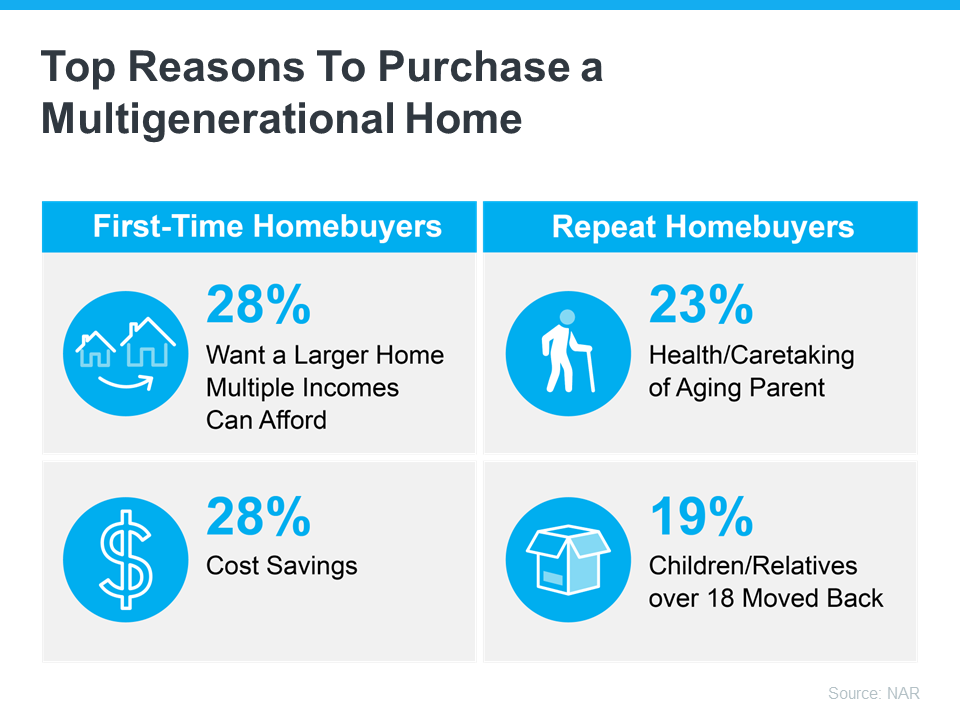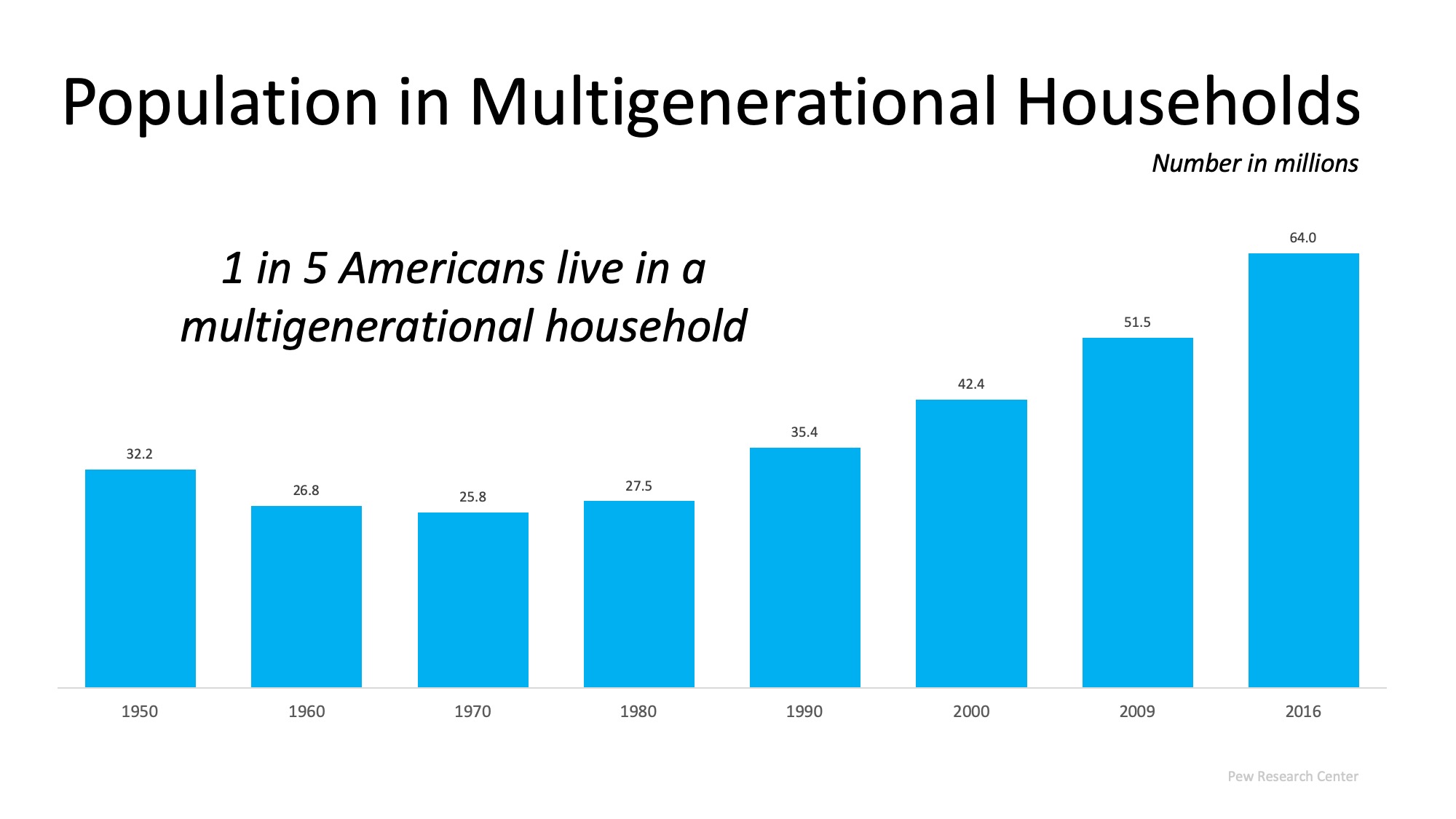Will Multi-Generational Homes Impact the Boston Condo Market?
Boston Condos for Sale
Sorry we are experiencing system issues. Please try again.
Will Multi-Generational Homes Impact the Boston Condo Market?
Has the idea of sharing a Boston home with loved ones like your grandparents, parents, or other relatives crossed your mind? If so, you’re not alone. More Boston condo for sale buyers are choosing to go this route and buy a multi-generational home. Here’s a look at some of the top reasons why, to see if a home like this may be right for you too.
Why Buyers Are Opting for Multi-Generational Living
According to the National Association of Realtors (NAR), two of the top reasons buyers are opting for multi-generational homes today have to do with affordability (see graph below):
First-time Boston condo for sale buyers are focused most on cost savings – with 28% saying this was a key reason for them. By pooling their resources with others, they can share financial responsibilities like mortgage payments, utilities, and more to make homeownership more affordable. This is especially helpful for those first-time homebuyers who may be finding it tough to afford a home on their own in today’s market.
Boston home buyers are also turning to multi-generational homes so they can more easily afford their dream home. Both first-time (28%) and repeat buyers (18%) chose to live with others so they could buy a larger home. When everyone chips in and combines their incomes, that big dream Seaport home with more space could be more within reach.
But multi-generational living isn’t just about the financial side of things. According to the same study from NAR, 23% of repeat buyers chose to buy a multi-generational home to make it easier to care for an aging parent. Many older adults want to age in place and a multi-generational home can help make that possible. For those older adults, it gives them an opportunity to maintain their quality of life while being surrounded by their loved ones. As Axios explains:
“Financial concerns and caregiving needs are two of the major reasons people live with their parents (and parents’ parents).”
Lean on a Boston Condo for Sale Broker
Finding the perfect multi-generational home isn’t as simple as shopping for a regular house. That’s because there are more people with even more opinions and needs to be considered. It’s like solving a puzzle, and the pieces need to fit just right.
So if you’re interested in the many benefits multi-generational living offers, partner with a local real estate agent who has the expertise to help.
Boston Condos and the Bottom Line
Whether your motives are financial or focused on the people you’ll share your home with, buying a multi-generational home may make sense for you. If you’re interested in learning more, let’s connect.
________________________________________________________________________________________
Will Multi-Generational Homes Impact the Boston Condo Market?
During the pandemic, many of us reexamined the meaning of home for ourselves and our loved ones. Today, that can be seen in the recent rise in multigenerational households. According to Jessica Lautz, Deputy Chief Economist and Vice President of Economic Research at the National Association of Realtors (NAR):
“Multi-generational buying may be a home where families live in the same home with elderly parents, children who have boomeranged back home, or other extended family members. While this is not a new concept of living, it is one which has gained recent popularity.”
And citing data from Pew Research Center, the Wall Street Journal (WSJ) says:
“. . . multigenerational living has made a comeback in recent years, particularly after the 2008 financial crisis and during the pandemic.”
So, if buying a multigenerational home has crossed your mind, you aren’t alone. Depending on what stage of homeownership you’re in, there are different reasons it could be the right fit. The chart below shows responses to a recent survey from NAR about the reasons people have bought a multigenerational home:
Whether your motives are financial or focused on the people you’ll share your home with, a multigenerational home has distinct advantages. It can make homeownership more affordable, and it can help you best support your loved ones. As Lautz explains:
“Multi-generational home buying is a way for families to care for one another, support one another, and often buy a home that may have been previously out of reach. . . . The trend of multigenerational buying appears to be firmly established and one that could expand in the future.”
Bottom Line
If you’re ready to buy a house, consider the opportunities of a multigenerational home. Let’s connect so you can explore your options in our area.
____________________________________________________________________________________________________
Will Multi-Generational Homes Impact the Boston Condo Market?
The pandemic has not just reshaped the housing market; for a growing number of homeowners, it is remaking the household. After years of slow growth, multigenerational living is on the rise. As members of the baby boom generation move into their 60s and 70s, many are being called upon by their adult children for help raising their young children, while others are looking for ways to care for their aging parents.
With prices for single-family homes soaring in much of the country, consolidating generations under one roof can mean more buying power, which in turn can provide access to less competitive segments of the housing market — namely, the higher end, where the larger homes are. (Buyer beware: It can also mean reliving family get-togethers every day of the year.)
“I think this could be a trend that’s here to stay,” said Jessica Lautz, vice president of demographics and behavioral insights at the National Association of Realtors, a large trade group.
Multigenerational buying has been expected to grow for years, she said, as families of Asian and Latino descent, who are more likely to live with aging parents, become a larger share of homebuyers nationwide. But it took the pandemic to spur the market.
In a national survey from April to June 2020, during the first wave of the virus, 15% of homebuyers said they bought multigenerational homes, the highest share since 2012, when the group began asking the question. In the eight months before the outbreak, only 11% had bought homes to live with multiple generations of family.
The most common reason cited for the purchase was to bring aging parents into the home because of concerns about isolation and the spread of COVID-19 in senior housing. It also reflects a desire to have grandparents help with child care, Lautz said, with so many parents either working from home or on new schedules.
A record 25% of homeowners in 2020 had lived in the same home for more than 20 years, up from 14% in 2010, in part because of high prices, very limited inventory and the cost of moving, according to Daryl Fairweather, chief economist at Redfin, a real estate brokerage.
While the pace of U.S. home sales has begun to slow, prices continue to surge. The national median existing-home price in May was $350,300, up nearly 24% from a year ago, a record-high price, and the 111th straight month of year-over-year price gains, according to the National Association of Realtors.
The rental market, especially in cities like New York, where inventory ballooned during the early months of the pandemic, has also influenced homeowners. Jose Madrigal, 68, an architect living in downtown Manhattan, had four tenants at the start of 2020 in his Astoria, Queens apartment building, including his 28-year-old son, Jose Jr. When the virus arrived, the other tenants ended their leases and left the city.
Multigenerational housing is gaining momentum in the downtown Boston real estate market.
![Multigenerational Housing Is Gaining Momentum [INFOGRAPHIC] | Simplifying The Market](https://files.simplifyingthemarket.com/wp-content/uploads/2021/04/08105559/20210319-MEM.png)
Will Multi-Generational Homes Impact the Boston Condo Market?
As loved ones start to get older, we start to wonder: how long will they be able to live alone? Will they need someone there to help them with daily life? There’s a reason to ask those questions now more than ever, as the average age in the U.S. is 78 years old! As a result, 41% of Americans in the market are searching for a home that can accommodate a multigenerational family.

Boston condos
The graph below shows the number of people by generation that purchased a multigenerational home because they will either be taking care of an aging parent or they just want to spend time together. Of those buyers, 26% indicated they will be taking care of an aging parent, and 14% said they want to spend time with an aging parent. These numbers do not come as a surprise. According to Pew Research Center, 64 million Americans (20% of the population) lived in a multigenerational household in 2016 (Last numbers available).An increasing number of studies affirm the benefits of being part of a multigenerational household. These benefits aren’t just for the grandchildren, but for the grandparents as well. According to these two resources:
The University of Oxford
“Children who are close to their grandparents have fewer emotional and behavioral problems and are better able to cope with traumatic life events, like a divorce or bullying at school”.
Boston College
“Researchers found that emotionally close ties between grandparents and adult grandchildren reduced depressive symptoms in both groups”.
This research gives helpful insight into why 41% of Americans are in the market to buy a multigenerational home.
Boston Real Estate and the Bottom Line
If you have a home that could accommodate a multigenerational family and are thinking about selling, now is the perfect time to put your home on the market! The number of buyers looking for this type of home will only continue to increase.
Boston Condos for Sale
Sorry we are experiencing system issues. Please try again.


